Kherson retreat: forever are diamonds, not Russia
Moscow's withdrawal from Kherson, the key city in Southern Ukraine it didn't just control from March 2022, but announced as part of Russia in September, raises concerns of what Putin is fighting for
Russia announced retreating from Kherson on Wednesday evening, and by the next morning, a significant number of troops were moved to the other bank of the Dnipro river. Over the next day, Ukrainian forces raised a flag in Snigirevka, a settlement on the border of Mykolaiv and Kherson regions, and entered nearly a dozen other settlements, paving the way to Kherson city that Russia controlled since early March 2022.
Symbolically, Russians established control of Kherson without any major fight. According to multiple statements by locals, there was literally no one to defend the city when the war broke out — neither army nor authorities, only a dozen of mobilized civilians who were given old rifles — understandably, useless against rolling Russian tanks. Now, the Ukrainians, too, could be taking back Kherson without any major fight.
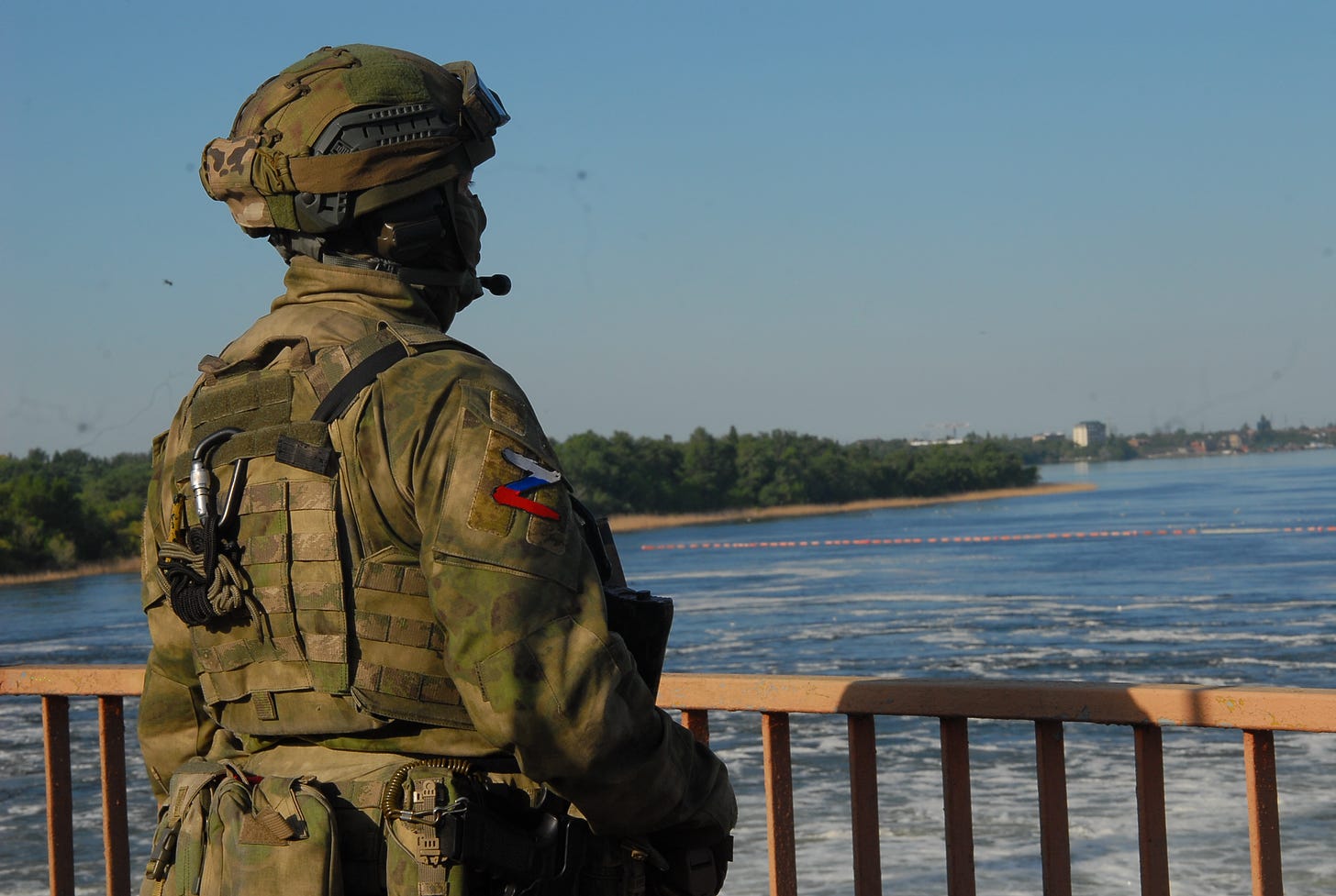
Russia’s withdrawal from Kherson, which, as it promised the locals, and to the Russians back home, “is with Russia forever”, was immediately labeled by western commenters as Ukraine’s “victory” and Russia’s “defeat”. While it could be too early to predict the battleground outcomes of this move in the longer run, the political consequences of the retreat are undeniably devastating for Moscow.
Difficult decision
The size of the Russian grouping in the Kherson region is estimated at around 20,000 or more, as opposed to around 80,000 Ukrainians gathered on the southern frontline. The concerns over the ability of these forces to fight back once Ukraine will start a counter-offensive were raised by field commanders and military experts since early summer, much before Kyiv actually got sufficient military supplies from NATO allies, allowing it to begin the advance. After the Antonov bridge connecting two banks of the Dnipro river was attacked by Ukraine in July, the voices became louder and even entered the public domain. But nothing was done then to radically improve the situation.
In September, reports emerged that Putin, who started playing a proactive role in direct management of the “special operation”, creating certain tensions in the commandment, has rejected requests for withdrawal. U.S. officials cited by NYT said that Putin’s refusal to pull back from Kherson has also led to a decrease in morale among Russian troops who have been mostly cut off from their supply lines and who appear to believe they could be left stranded against Ukrainian forces.
On November 3, the first reports of Russian flags disappearing from Kherson administrative buildings appeared, but no public discussion on the inevitable retreat followed. On the morning of November 9, fresh videos of absent flags emerged, immediately followed by news that the key bridges were being blown up supposedly by the Russian military to slow down the advance of the enemy.
In the afternoon major news broke out. The deputy head of the Kherson region Kirill Stremousov was announced killed in a car crash. Stremousov was a proactive spokesperson and lately “became a bit uncontrollable”, as some commenters put it. Despite his death looking somewhat mysterious, with rumours pouring in that he was either eliminated by Russians or made ”disappear”, it couldn’t overshadow the news of troops’ withdrawal announced a few hours later.
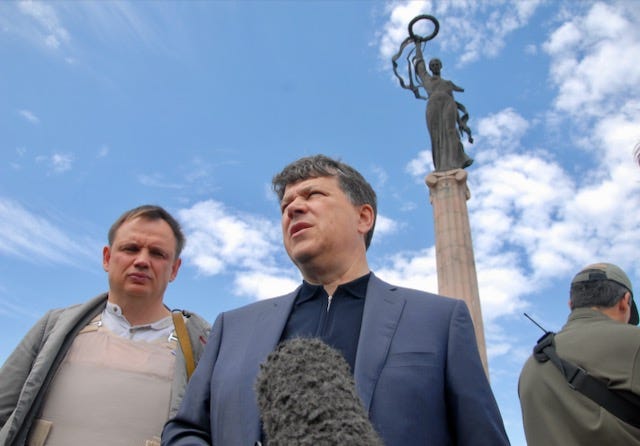
The surrender of Kherson was announced in a manner that seemed a bit too much to digest for so-called Z-patriots. It was presented as a decision taken by Defence Minister Sergey Shoigu based on a report delivered by army General Sergey Surovikin, recently named in charge of “special military operation”, during a military meeting aired on TV.
Surovikin began his speech by saying “the situation in the area of the special operation has been stabilized” and claiming Ukrainian forces lost over 12 000 people, including 350 foreign mercenaries, most of these losses — over 9500, in the Mykolaiv-Kherson frontline and that Russia’s losses in Kherson region were 7-8 times smaller than those of the AFU.
Surovikin then said despite Ukraine’s repeated advances having been repelled, Kherson city and the adjustment settlements “cannot be properly supplied and managed”. Moving on with arguments, including risks posed by new potential attacks on Nova Kakhovka dam, he finally suggested withdrawing to the left bank of the Dnipro river and establishing defense there.
"I understand that this is a very uneasy decision. At the same time, we will preserve, which is the most important thing, the lives of our servicemen and, as a whole, the combat capability of the group of forces, which is inexpedient to be kept in a limited area on the right bank. In addition, this will release a part of forces and capabilities that will be involved in active operations, including for offensives in other directions in the zone of the operation," Surovikin said.
“Proceed with the withdrawal of troops and take all measures to ensure the safe transfer of personnel, weapons, and equipment across the Dnipro River,” Shoigu ordered in response.
The absence of the key decision maker — Russian President Vladimir Putin — in this discussion was seen by most of the commenters as yet another attempt to transfer responsibility for an unpopular decision from him to the military.
Vladimir Putin doesn’t like accepting mistakes, or announcing “bad news”. He spent Wednesday meeting ex-Health minister Veronika Skvortsova, now Head of the Federal Medical-Biological Agency, and addressing a celebration of the 75th anniversary of that agency. On that day, Putin also signed a document on “foundations of the state policy for the preservation and strengthening of traditional Russian spiritual and moral values”.
For many in Russia, this exchange between key military figures, broadcasted inside and outside the country, reminded a badly staged drama. We’ve seen this before — on February 21, two days before Vladimir Putin ordered troops to march into Ukraine. Then, too, the entire country, and the world, watched the meeting of Russia’s security council on “recognising” Donetsk and Luhansk People’s Republics with a weird feeling that they had been sold free tickets to the circus. Nine months later, the difference is — no one had the courage, or energy, to joke.
Smart plan or a bargain?
The immediate reactions from military journalists, bloggers, and Z-channels varied from “All is lost!” to “this must be a tactical withdrawal in order to deceive the enemy” (and Kyiv promptly reacted by saying Russia’s words shouldn’t be trusted) to “we are fooled, this is some kind of a bargain”.
Some military bloggers accused the authorities of surrendering the city, calling this decision a "betrayal" of both the military and the locals whom Russia promised to “stay forever”. Similar promises were given to people in the Kharkiv region, but as September events showed, they were broken as hastily as they were made.
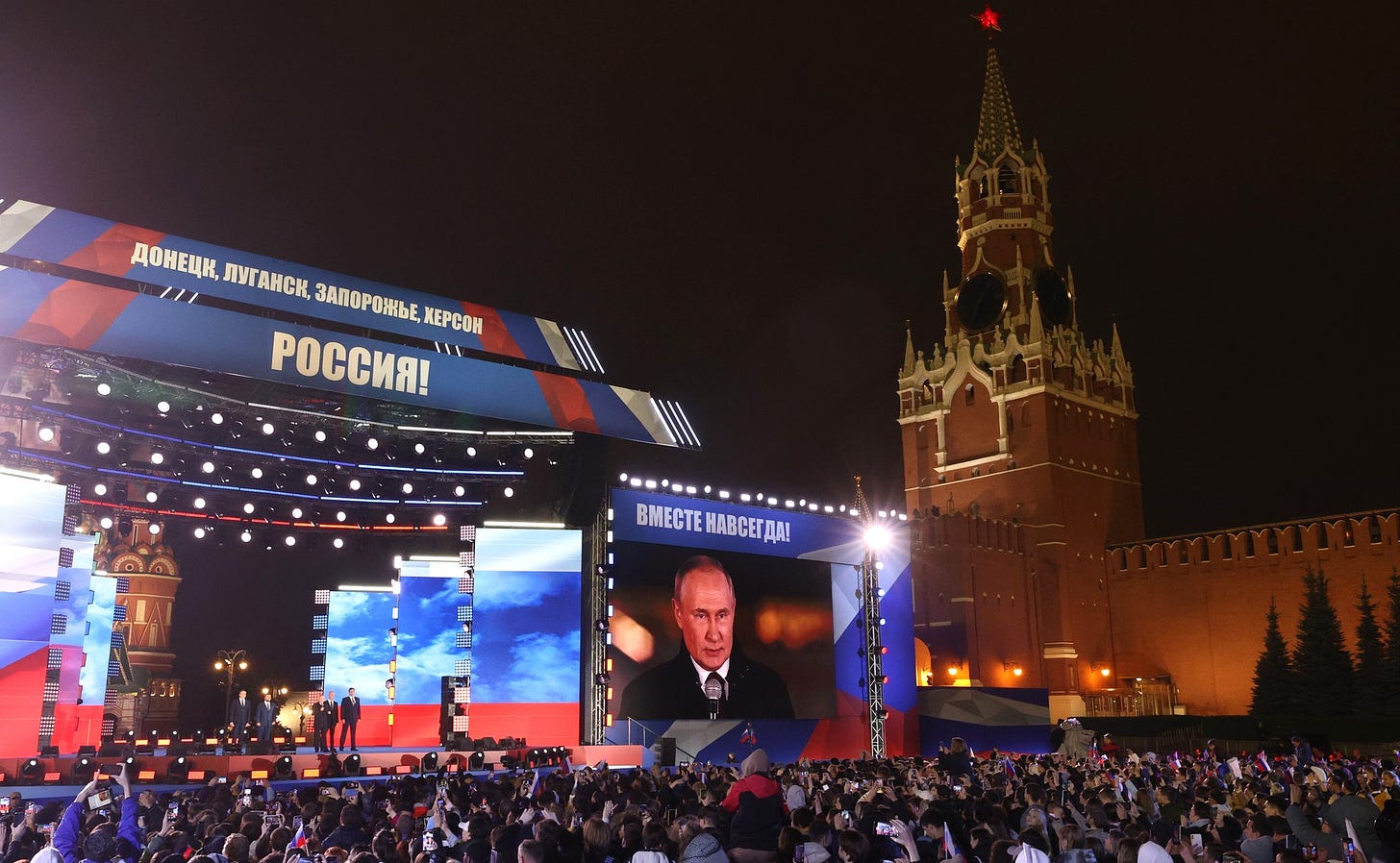
Some influencers, including RT’s Margarita Simonyan, compared the retreat with the surrender of Moscow to French emperor Napoleon in 1812, stressing that his army was eventually defeated. The key argument propaganda was trying to push is the need to preserve the army — something that both Surovikin and Shoigu emphasised.
“GREY ZONE” telegram channel, associated with the Wagner mercenary group, said there was no justification for surrendering the city: "Betrayal and treason around Kherson will be justified and smoothed out, by claiming that nothing could have been done. It could have been, but not during the last days. [It should have been done] before June. But absolutely nothing was done."
The leader of Chechnya Ramzan Kadyrov and the founder of the Wagner mercenary group Yevgeny Prigozhin, both of whom have since lately emerged as active commenters on Russia’s “operation” and both of whom act like “big fans” of General Surovkin, released supportive comments approving the decision to withdraw troops.
“Kherson is a very difficult area without the possibility of a stable regular supply of ammunition and the formation of a strong, reliable rear. In this difficult situation, the general acted wisely and far-sighted - he evacuated the civilian population and ordered a regrouping,” Kadyrov wrote.
Prigozhin pointed out that the retreat was not a “victorious step”, but, he noted, “it is important not to agonize, not to fight in paranoia, but to draw conclusions and work on mistakes. And after that, to understand who is right, who is to blame, and what is the essence of the problem”. He referred to Surovikin as “ a man who is not afraid of responsibility” as he took a tough decision and also because the task is not easy to implement without losses. ”I want to emphasize that the withdrawal operation is always extremely difficult,” he wrote.
According to military blogger Vladlen Tatarsky, the retreat from Kherson can be compared with the retreat from Kyiv at the beginning of the war, but, he pointed out, it is necessary to fight for the city and not give it up without a fight. Some commenters suggested Kherson could become (or should have been made) another Mariupol, though their assessment of whether the Russian army can hold defense for a long time, while the city is being bombed by NARO-supplied weapons, varied drastically.
Some even suggested that burning down Kherson with a nuclear strike would be better than surrendering it to the enemy because local people have “believed in Russia” and leaving them behind won’t be forgiven.
Key military reporters, who have been on the frontline since February, showed no signs of shock or surprise. Many of them not once pointed out the issues faced by Russian troops deployed to Southern Ukraine, voicing concerns over the future of supply channels. “The withdrawal to the left bank is a military necessity. Till the last moment, I wanted to believe the situation would change, and there would be no "difficult decisions", but it didn't happen," Evgeny Poddubny wrote.
As political analyst Igor Dmitriev noted, “the very essence of the current Western strategy is to create such a situation around the enemy that he himself will leave. Not to storm its fortifications bluntly, but to make the defense impractical. So that it takes incomparably more resources. And the situation with Kherson is a vivid example”. According to Dmitriev, Russian officials refused to surrender Kherson for a long time, mainly because of the reputational losses that kept growing alongside the decline of stability of the frontline.
Those commenters, who still had the capacity for humor, asked: “So what is the status of Kherson and the region? Is it temporarily abandoned? Temporarily occupied? Wrongly abandoned? Donated? Returned as an act of goodwill? Exchanged for the inviolability of the lands of the Belgorod region? Well, there must be some kind of status”.
For the general population that does not track Ukraine news 24/7 and follows mainly TV propaganda, the surrender of Kherson was predictably presented as "regrouping" and "maneuvers". No TV channel used any such words as “retreat” or “withdrawal” or highlighted the key decision to leave Kherson in its headlines.
Ground realities
As we noted before, it was evident to many, both in Russia and outside it, that keeping the troops in Kherson would be not just problematic but devastating — Moscow could lose most of its elite, well-trained, and equipped units deployed to Southern Ukraine.
Given both the issue of undersupply that became evident early into the war, particularly concerning modern surveillance, reconnaissance, and target tracking equipment (something that Ukraine was effectively supplied with by the NATO allies), as well as disrupted supply routes, the troops in Kherson region could eventually just run out of artillery shells.
“This war… is 80% about artillery. Low accuracy means wasting a large number of shells, and this means constant logistics is required, and in conditions when river crossings are constantly attacked, provided that the enemy has good reconnaissance and an effective strategy of “isolating combat areas" — there was a risk that at the decisive moment the artillery systems will have to be abandoned and left simply because they have nothing to fire. And when a 20 000 grouping is facing 80 000 one and you cannot send more people there, precisely because the supply route is disrupted, you can defend positions for a long time — the result will be bloody, heroic, and still not in Russia’s favor,” Alexey Chadaev, who often appears on Russian state-controlled TV channels as an expert, wrote.
Withdrawal from Kherson would allow the Russian military to pull back across the Dnipro River preserving its equipment and saving the lives of soldiers — provided that Ukraine does not attack (Western experts and Ukrainian commentators immediately anticipated, not without satisfaction, that the retreating forces would become an easy target for the Ukrainian military).
However, it also means that Russia is abandoning territory that it claimed its part (protected by its nuclear capabilities) and endangering Crimea, which it annexed back in 2014, as now Crimea will be an easier target for Ukrainian forces. The withdrawal itself won’t be an easy task as moving troops could become a target for Ukraine.
Finally, the local residents of the Kherson region, many of whom supported Russia and voted in favour to join it, are clearly in danger of being jailed or even killed by Ukrainians.
Trap for civilians
The biggest loss for Russia would be the support of the local population it enjoyed in the territories hastily annexed. Kherson was the most difficult case of all, with many residents openly expressing their opposition to Russia’s control. While Kherson is mainly a Russian-speaking city, not everyone was welcoming the Russians back in March.
Things might have changed over the course of nine months, with Russia trying hard to keep the city well-managed and well-supplied, promising people jobs and development. The fact that this territory hadn't seen any major hostilities — till September when Ukrainian forces started shelling the city and the villages intensively, also played a key role in the way local residents perceived the conflict.
The Kherson retreat would now send a strong signal to other territories currently under Russian control. And this would give a boost to Ukraine’s guerrilla warfare which has been proven very effective (let’s not forget the war is on Ukraine’s land).
To be fair, unlike in the case of the northern Kharkiv region, where troops’ retreat was described by themselves as “complete chaos”, in Kherson Russians prepared a good ground for withdrawal, at least what concerns the civilians. Massive evacuation efforts were initiated on October 18, and as per the latest data from Surovikin, over 115 000 residents willing to move out of Kherson and other settlements were evacuated to the left bank of Dnipro, towards Crimea.
Along with people, mainly elderly, including disabled people, as well as families with children, and pets, pro-Russian authorities also evacuated monuments — something that seems to be a sore spot for the Kremlin given that Ukraine and the host of Russia’s European neighbors are on a high spree to destroy them.
The evacuation continued from October 18 and was completed, according to local authorities, by November 1. Russia had to clarify many times that evacuation was voluntary while Kyiv painted the effort as “deportation”, and the Western media has no hesitation to label it so, ignoring not only the fact that Ukraine shelled the evacuation points and killed people who were trying to flee but the painful reality of Kherson residents who were warned by Kyiv they will be persecuted or “collaborating” with Russians. Galina Lugovaya, recently appointed by Vladimir Zelensky as the head of the Kherson City Military Administration, told the local media those residents who “collaborated” with Russians “would be shot as dogs” by the Ukrainian military. Collaborating, for Kyiv, includes serving food, changing wheels, and selling bread (or anything else) to Russians.
This scenario has already played out in the Kharkiv region earlier in September, and this is something that Ukraine has publicly confirmed — with no objection, or even criticism, from its western allies.
“In the social media they keep sending messages that we should refuse to go to work, we should stay at home, that AFU is coming soon to take Kherson,” a young woman told me when I visited Kherson as a part of a press tour organized by the Russian military back in May.
“But how do we feed our families if we do not work?” the lady asked. “The Ukrainians have labeled everyone who hasn’t left, collaborators. What do I do if I do not have relatives in Lviv or money to go to Europe?”
According to political expert Georgy Bovt, the consequences of withdrawal from Kherson could be, on one hand, focusing on defending the Donetsk and Luhansk regions, while providing a land corridor to the Crimea, which is not lost with the withdrawal from Kherson, and secondly, Russia could possibly start looking at a political settlement of the conflict, based on new territorial realities. “In this case, in the near future, we will have to test the assumptions that somewhere, perhaps, moves are being made to achieve what can be called a territorial compromise,” he told local media. Whether retreat was a part of those “compromises”, should be seen in the coming weeks, he noted.
Sergey Markedonov, a leading researcher at the MGIMO Institute for International Studies, commenting on withdrawal in a Facebook post, called the decision “a major political defeat” both on domestic and foreign policy levels.
“It is necessary to call a spade a spade… There has been nothing like this since Khasavyurt-1996. Its goals [of the “special military operation”] are more distant, while security and stability are less”, he noted, hinting at the withdrawal could be a sign of power elites' struggle. Markedonov added that “Inconsistency of actions” — mobilization, territorial expansion, and at the same time retreat and loss of initiative, is most worrying.
As many commenters pointed out, the surrender of Kherson, which suddenly became “unviable” to defend, raises questions over what is viable, and what is valuable — in other words, what exactly are the goals and values Russia has been fighting the devastating war, launched on the pretext of “protecting” the Russian-speaking population and “liberating” it from “Nazis” and “drug-addicts” in Kyiv.



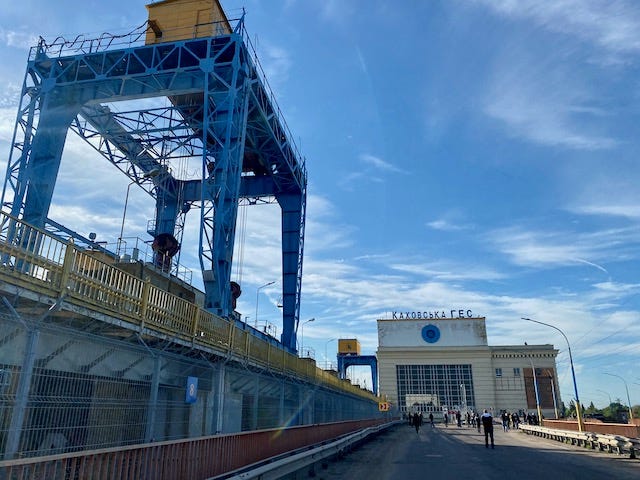
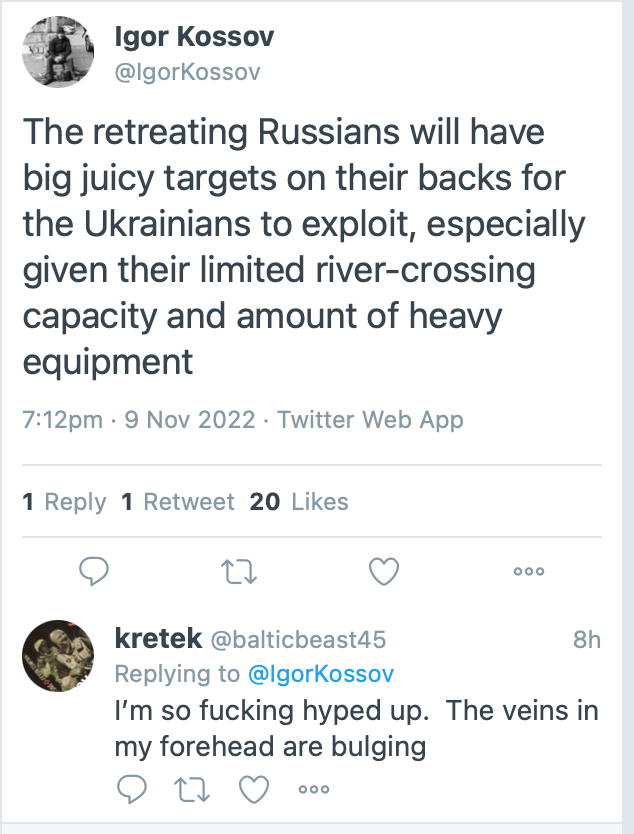
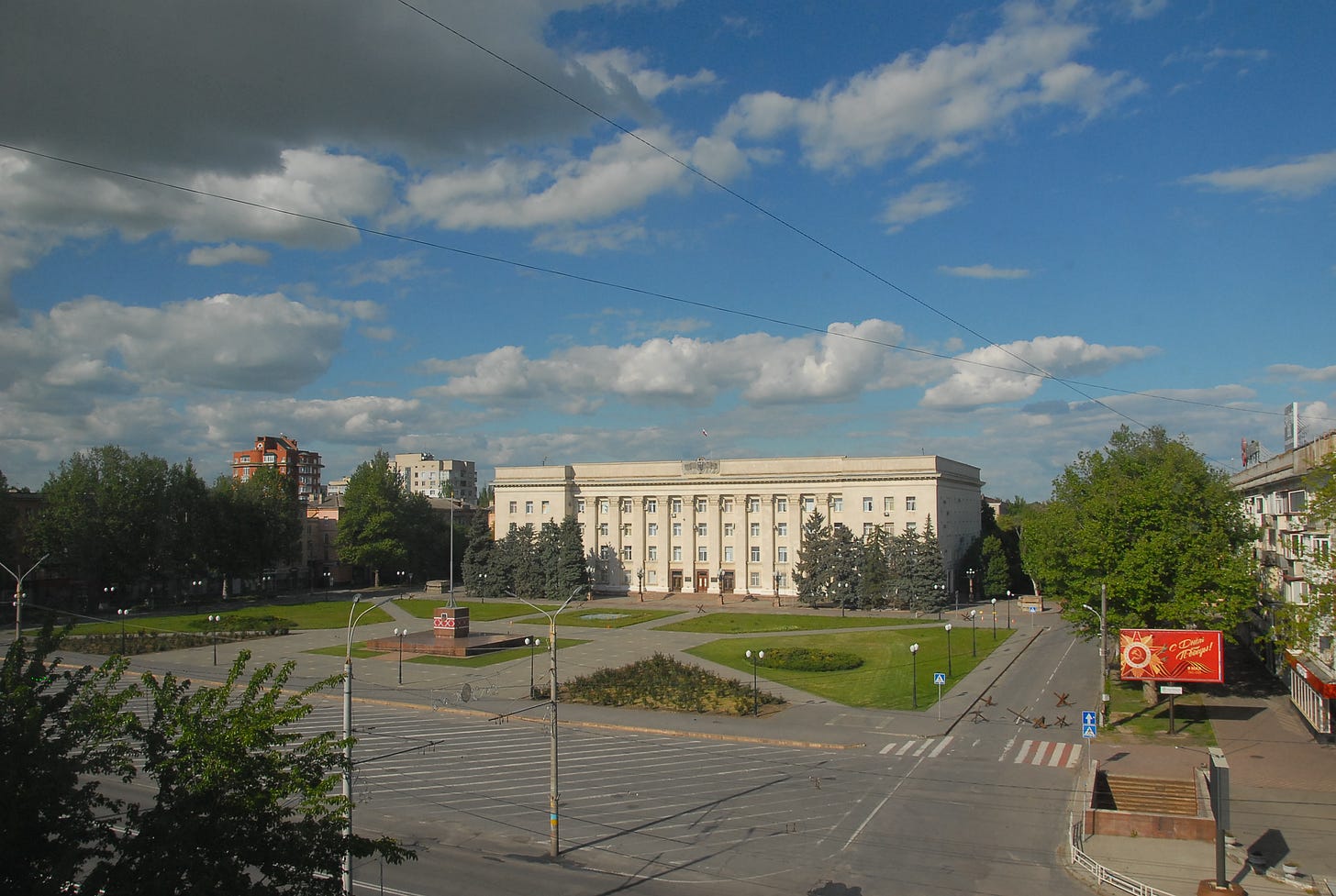
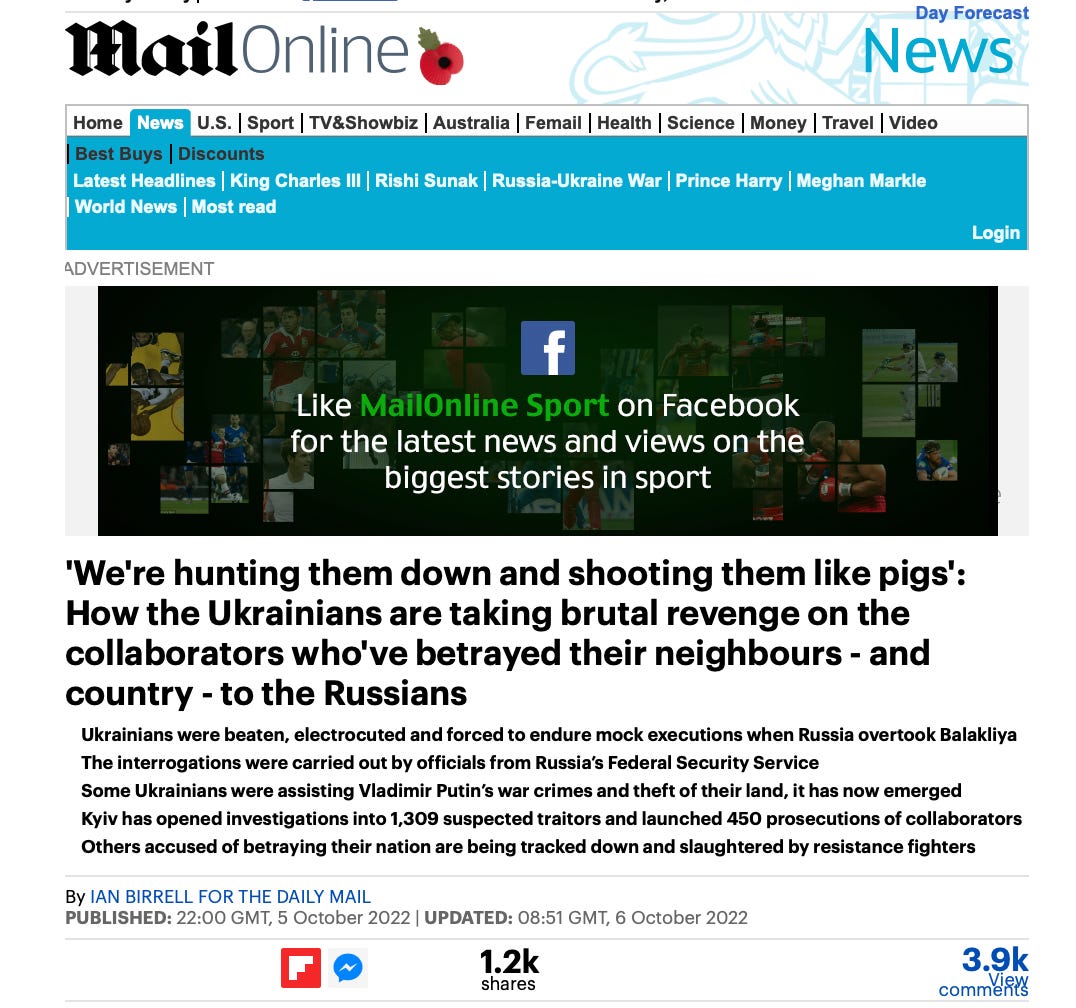
Excellent writing!